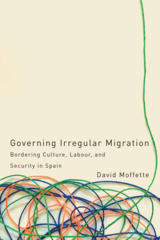
Securing Borders
Detention and Deportation in Canada
Detention and deportation are the two most extreme sanctions of an “immigration penality” that polices noncitizens, identifies those deemed dangerous, diseased, deceitful, or destitute, and refuses them entry or casts them out. They play a key role in regulating national borders, citizens, and populations. But what determines whether a noncitizen is “deserving” or “undeserving”? And how have anxieties about risky outsiders and the quest for security shaped Canada’s response to immigrants and refugees?
Anna Pratt takes a close look at the discursive formations, transformations, and technologies of power that have surrounded the laws, policies, and practices of detention and deportation in Canada since the Second World War. She demonstrates that although the desire to fortify the border against risky outsiders has long been prominent in Canadian immigration penality, the degree to which concerns about security, crime, and fraud have come to govern the process is unprecedented.
Securing Borders traces the connections between seemingly disparate concerns – detention, deportation, liberalism, law, discretion, welfare, criminal justice, refugees, security, and risk – to consider them in relation to the changing modes of Canadian governance.
This work is a rich interdisciplinary study which promises to be of interest to scholars in a range of disciplines including criminology, socio-legal studies, law, history, sociology, political science, international relations, and public administration. It will also be of interest to non-governmental advocates as well as to government representatives who work in the areas of immigration, refugee determination, and related fields.
This work is a rich interdisciplinary study which promises to be of interest to scholars in a range of disciplines including criminology, socio-legal studies, law, history, sociology, political science, international relations, and public administration. It will also be of interest to non-governmental advocates as well as to government representatives who work in the areas of immigration, refugee determination, and related fields.
This book goes a long way to render visible the material conditions and tangible practices of the detention and deportation of undeserving and undesirable non-citizens, who are essentially being criminalized for the mere act of migration.
Anna Pratt, a sociologist who teaches criminology, examines an important aspect of Canada’s refugee policy – detention and deportation – from the perspective of human rights and social justice. She sees larger a pattern in connections between the federal government’s immigration and refugee policies, public concerns about crime and welfare fraud, media reporting on immigrant communities such as Toronto’s Somalis, and the trend towards neo-liberalism.
Ultimately, Pratt writes convincingly of how (specific groups of) humans have become the object of management. This book also urges for research on a number of immigration management-related issues (e.g. discretion on the part of immigration officials). What I also consider a strength of the book is that it brings abundant light onto these minority ethnic groups in Canada that are relatively neglected by research … it will be invaluable for the researcher of immigration and ethnicity as well as to public official working with migrants and NGO workers.
Pratt’s book provides a complete and lucid analysis of the darker side of immigration policies in Canada. It maintains balance between a theoretical framework, historical backgrounders and practical illustrations, as well as between law and social science insights which will make reading accessible to a larger audience…It is, arguably the most complete and up-to-date Canadian book on detention and deportation.
Securing Borders provides an excellent historical and comparative perspective from which to understand thoughts and practices that govern Canadian borders, and more importantly, determine who can and cannot become Canadian citizens. Against that background it reveals how deportation and detention in Canada with its attendant securitization of risk have become the dark side of Canadian citizenship.
1 Overview and Orientations
2 Detention at the Celebrity Inn
3 Reframing Discretion
4 From Purity to Security
5 Floods and Frauds
6 Risky Refugees
7 Discretion, Dangerousness, and National Security
8 Criminals First
9 Risk-Smart Borders
10 Conclusion
Appendix:
Notes
Bibliography
Index






